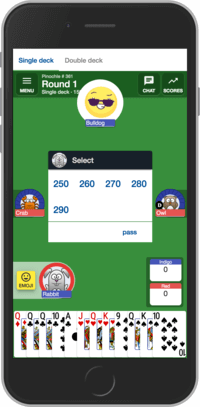Overview
Pinochle is a trick taking and melding game where teams of players try to be the first pair to win 1500 points. Pinochle can be played with 3, 4, 6, or 8 players. With 4, 6, and 8 people, players are divided into teams of 2. With 3 or 4 people, players can play solo.
Ranking of Cards
In Pinochle, Aces are high and 9s are low. 10s are the second highest, ranking above the King.
Presets
- Single Deck: 12 cards per player, starting bid is 250
- Double Deck: 20 cards per player, 9s are also removed, starting bid is 500
- Cutthroat: Played solo (with a single deck) - Starting bid starts 50 lower, default at 200 instead of 250. Lower starting bid would be 100 instead of 150
Play Multiplayer Pinochle Online
The Deck and the Deal
For a single deck, Pinochle is played with a 48 card deck containing two sets of Aces through 9s. After teams are decided amongst the players, the dealer passes out 12 cards if there are 4 players, 8 cards if there are 6 players and 6 cards if there are 8 players. If there are 3 players and pass cards is disabled, players get 16 cards; if pass cards are enabled, players get 15 cards.
For a double deck with 4 players, Pinochle is played with an 80 card deck containing four sets of Aces through 10s; the dealer passes out 20 cards. For a double deck with 6 or 8 players, Pinochle is played with a 96 card deck containing four sets of Aces through 9s; for 6 players the dealer passes out 16 cards and for 8 players the dealer passes out 12 cards.
How to Play
The Bid
The players take turns in naming their bid, starting with the dealer and going clockwise. The minimum opening bid is 250 points. A player can raise the bid by 10, 20, 30, 40 or 50 points at a time. A player can also pass, in which case they do not place a bid and are out of the bidding for that round. Bidding ends when three players have passed.
Whoever bids the most will get to decide which suit is the trump suit for the round. The winning bid is called the contract and the player who won the bid is called the declarer. The trump suit and the contract are displayed in the top right corner, along with each pair's current total points.
Passing Cards
The declarer and their partner then get the opportunity to exchange 4 cards. The number passed can also be set in the Options menu to 3 or this stage can be disabled.
The Meld
Before play starts, players score points from having certain combinations of cards in their hands. These combinations are called 'melds'. Melds are displayed by all players before being returned to their owner's hand. A card can be reused in multiple melds, provided each meld is a different type. At Cardzmania, melds will be calculated for you, but for reference, here's all the possible types of melds:
Type 1 - Runs and Marriages
Runs (All cards must be the trump suit)
- Bare Run (Ace, Ten, King, Queen, Jack) - 150 points
- Run with Extra King - 170 points
- Run with Extra Queen - 170 points
- Run with Extra Marriage (Extra King and Queen) - 190 points
- Double Run (Two of each) - 1500 points
Nine of Trump Suit (lowest trump card also known as dix, pronounced 'deece') - 10 points
Marriages (King and Queen of same suit)
- Royal Marriage (Trump suit) - 40 points
- Common Marriage (Other suits) - 20 points
Type 2 - Pinochle
One Jack of Diamonds and one Queen of Spades - 40 points
Two Jacks of Diamonds and two Queens of Spades - 300 points
Type 3 - Arounds
A set of one card of each suit
- Ace - 100 points
- King - 80 points
- Queen - 60 points
- Jack - 40 points
Both cards of each suit
- Ace - 1000 points
- King - 800 points
- Queen - 600 points
- Jack - 400 points
After the points for the melds have been calculated, the declarer gets a chance to choose whether to 'throw in' or 'play' the round. There are at most 250 points available during play, so if the declarer needs more than 250 points to equal their contract after counting their points from the melds, then they cannot possibly meet their contract and must throw in. If the declarer chooses to throw in, the round ends and the declarer's team loses points equal to their contract, while the opposing pair keep the points from their meld.
Trick Taking
If the declarer chooses to play, the round proceeds to playing 12 tricks.
Pinochle does not follow standard trick play rules, instead it has must-win trick play. This means that in any trick a player must always play a card that wins the current trick if they are able to.
In the first round, the declarer leads first and every other player must play a higher card of the same suit, if able. If a player does not have a card of the leading suit, but has cards of the trump suit, they must play the trump, because they must play a winning card. If a player does not have a card of the leading suit or the trump suit, they may play any card from their hand.If trump cards have been played in the trick, then the highest value trump card played wins the trick. Otherwise, the highest value card of the correct suit wins. If there are two matching winning cards, then whichever was played first wins.
At the end of each trick, the winner takes all the cards from the trick and scores points based on those cards. Whoever wins the trick also leads the next trick.
Once all 12 tricks have been played, the round ends and bidding begins for the next round.
Scoring
There are four different scoring methods available. Players score points based on the cards in the tricks they won.
- Option 1: Aces, Tens & Kings: 10 points each
- Option 2: Aces, Tens & Kings: 1 point each (simplified option - all other points divided by 10)
- Option 3: Aces & Tens: 10 points each; Kings & Queens: 5 points each
- Option 4: Aces: 11, Tens: 10 points each; Kings: 4 points; Queens: 3 points; Jacks: 2 points
In all cases, winning the last trick is worth an extra 10 points (or 20 points with double deck).
Winning
The game ends when one pair has reached 1500 points. The target points can also be set to 1000, 2000 or 2500.
The game can also be set to end after a certain number of rounds. This can be set in the Options menu. The available options are three, five or ten rounds.
Variations
CardzMania supports several customizable rules and options so you can play Pinochle exactly how you like or how you grew up playing with your friends and family. In addition to the classic way of playing, we often have new creative options for you to try to spice up the game if you are interested in trying different spins for fun.
Points
Players determine a set amount of points when the game ends.
Rounds
Players determine a set amount of rounds (also known as hands or deals) that the game will go to (instead of the points selection above).
Timer
Players only have a set amount of time to make their turn after which a turn is automatically played for them and the game proceeds: Fast is 7 seconds, Standard is 15 seconds, Slow is 30 seconds, and Very Slow is 60 seconds. Players can also choose to disable the timer, but that is only for private tables.
Pass Cards
The number of cards a player can pass to their partner after calling trumps can be set to 3 or 4, or passing cards can be disabled entirely.
Must Win
When enabled, players determine whether you must win when any suit is played, or only when trumps are played. Irrespective of this option, you must always trump if you are void of a non-trump suit to win the trick (standard pinochle rule).
Redeal
When enabled, if a player has more than five 9s, they can choose to redeal.
Extra Trump KQ
When enabled, extra points are awarded for additional Kings and Queens in a trumps run. The extra points are as follows: 20 extra points for any Queen or King, 40 extra points with both a Queen and King (also called a Royal Marriage).
Scoring Method
Four scoring systems are available:
- (Default) Aces, Tens & Kings: 10 points each
- Aces, Tens & Kings: 1 point each (simplified option - all other points divided by 10)
- Aces & Tens: 10 points each; Kings & Queens: 5 points each
- Aces: 11, Tens: 10 points each; Kings: 4 points; Queens: 3 points; Jacks: 2 points
Shoot The Moon
When enabled, if the dealer bets 12 tricks and wins all of them, they shoot the moon and win the following bonus points:
- Bonus Run Points (150/15)
- Bonus Trick Points (250/25)
- Double Bid Points
- Double Run Points (1500/150)
Lower Starting Bid
When enabled, players can change the starting bid for a single deck from 250 to 150 and the starting bid for a double deck from 500 to 300.
Pinochle Strategy
Pinochle is really popular in United States. Winning the game requires a lot of coordination between players especially with passing involved. All trick leads are very important especially if you have a lone ace, you want to play that early up. More detailed strategy coming soon...
Trick Basics
Trick Taking games center around having the highest ranked card in a draw. Typically, players of trick taking games sit in a circle, sometimes in teams and sometimes playing solo, and are dealt a hand of cards. Given the specific game's card ranking (and trump - special suit that beats other suits), players draw a card from their hand in hopes that it outranks the other cards played. The player who outranks the others wins the trick for that round and gameplay is repeated until the cards are exhausted. Typically the player or team with the most tricks wins the game.
In a trick, each player plays a single card. One player is selected to start, then play proceeds clockwise around the table. If possible, players must play a card which is the same suit as the first card played - this is called 'following suit'. If a player cannot follow suit, then they may play any card in their hand. Based on the cards played, one player is declared the winner of the trick, usually for playing the highest value card of the trump suit, or of the suit of the card which started the trick.
After all cards have been dealt, normal trick taking commences. Remember all cards of the suit declared as trump (trump cards) beats any other suit. Whichever team wins seven tricks out of thirteen wins the round, winning all thirteen tricks is referred to as court. If the dealers team achieves this feat, its called a goon court. In single sir, winning the first seven consecutive tricks constitutes a court.
After cards dealt, depending on the trump, you have to figure out your strategy for the game whether to play trump first or not. In single sir / single sar winning the first seven tricks constitutes as a court or a goon court, so the strategy is very different than double sir / double sar. Whichever team (dealers team or trump callers team) wins seven tricks wins the deal and the opposing team becomes the dealer. In double sir, you have to win two consecutive tricks, so the strategy is totally different as you need to keep another high card to win the pile. Note that the second and the second last trick cannot be won, so you have to be extra careful about that too. This game is played in many variations so you have to be extra careful about the rules.
Based on the cards played, one player is declared the winner of the trick, usually for playing the highest value card of the trump suit, or of the suit of the card which started the trick.
Hand
The cards that a player is dealt forms their hand. Each round, a player selects one of the cards in their hand and plays them into the pile. In most trick taking games, all players are dealt the same number of cards and the hand is hidden from the other players, but in some games, like 500, a player can reveal their hand for bonus points.
Pile
The pile is the spot where players place their chosen card for the round. The player with the highest ranked card receives all of the cards in the pile and sets them to the side. In most trick taking games, the individual cards in the pile have a specific point value that is given to the winner.
Dealer
The dealer is chosen at random and passes out the deck of cards to form each player's hand. In most games, the dealer position rotates to the left once the deck needs to be re-shuffled and re-dealt.
Trump
Arguably the most important part of any trick taking game, the trump suit is the highest ranked suit in the game. Every game has its own method of selecting trump. Some games leave the selection up to the winner of the bid while some games make the suit of the lead card the trump suit.
Order
The ranking of the cards is dependent on the game. Ace is usually considered the highest in trick games, but some games from Europe, like Klaverjassen, have the Jack of trump the highest card.
Auction/Bidding
Most trick taking games contain an auctioning/bidding phase at the beginning of gameplay. During this time, players take turns bidding how many tricks they expect to win in the game. The player with the highest bid leads the first trick and decides the trump suit in most games. Often times, if the winner of the bid, sometimes called the declarer, fails to win the amount of tricks they bidded, they receive a lot of penalty points
Lead Card
The Lead card is the first card in the trick. In most trick taking games, subsequent players need to play the suit of the lead card if they can.
Card Game Basics
A deck of cards consists of 52 cards, with 4 distinctive subgroups. Each of these subgroups is recognised by a symbol and are referred to as suits. They consist of Clubs, Spades, Hearts and Diamonds. Each suit contains 13 cards which, generally, are considered in this order, Ace (A), 2, 3, 4, 5, 6, 7, 8, 9, 10, Jacks (J), Queen (Q) and King (K). Some games include the two Jokers found in a standard deck but most games don't.
Feedback
Would like to discuss new features or variations for Pinochle? Need a custom rule? Have a question? Got a suggestion? Don't see a game you want to play? Please contact us by
email, facebook or twitter - we really value your feedback and love hearing from all of you!
This site uses cookies. By continuing to browse the site you are agreeing to our use of cookies.




